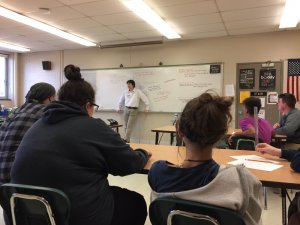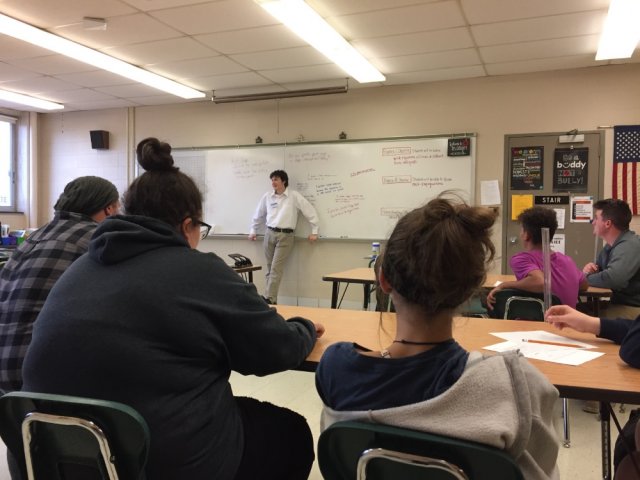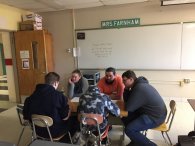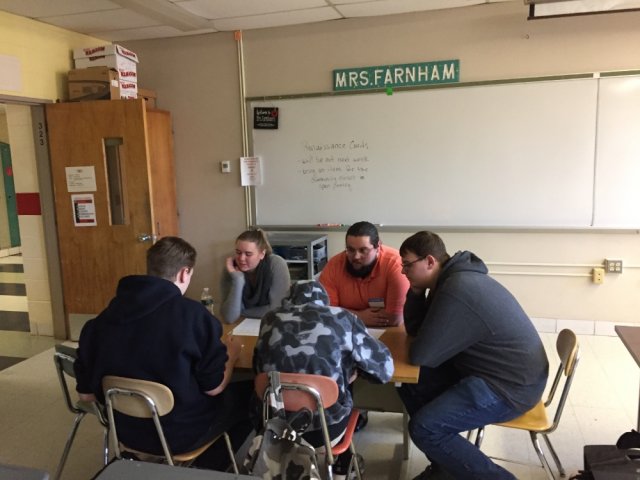Teaching Future Teachers: A Lab Class
Written by: Dr. Christine von Renesse and her students Mackenzie Connor, Joe Goncalves, Selena Hewett, Jacob Kapinos, Ryan Koczela, Sam Rehor, John Reilly, and MyLinh N. Roy.
In this blog, you can first read Prof von Renesse's description of the big ideas of the class and the general organization. Then the students reflect on how this semester of teaching high school has influences their thinking about being a teacher and the art of teaching. At the end of this blog you can find our lesson plans, the class syllabus and our reading list. Enjoy :)
The Idea of the Class:
The class “Exploring the Mathematical Knowledge of Teaching (Middle and High School)“ is designed to help future teachers:
- learn about how to teach mathematics with inquiry,
- practice teaching with inquiry,
- inquire into their own beliefs as teachers of mathematics,
- see that there is a mathematical knowledge of teaching that they may not have learned in their mathematics courses yet,
- build their mathematical knowledge for teaching.
Our department suggest that students take this class early (after their freshmen year) to determine if teaching is a good choice for them and to learn important teaching techniques before they start their practicum in their senior year.
I believe that learning happens best in an inquiry-based way - this applies to learning mathematics, but also to learning how to teach mathematics. Therefore I can’t tell my college class how to teach but I have to create a learning environment in which they can experiment with teaching and learn for themselves what works best and why.
I love teaching this course as I get to see my college students grow into more confident teachers. It is challenging but also rewarding to get to know my students well enough to help them discover what may be in the way of teaching and what they are ready to learn next.
In addition to the mathematical topics, we read and learn about growth mindset, making mistakes, brain growth, how to create personal connections, presenting cool things in mathematics, inventing extension problems, asking good questions, facilitating discussions, and math anxiety.
Some students may learn that teaching is not their passion, while others deepen their commitment.
After a description of the organization of the class, you can read about the experiences of the college students in their own words.
Organization:
Once a week our class met at the college to plan and reflect, the other meeting took place at the local high school where we taught algebra. We collaborated with two algebra classes: a regular algebra class and slower paced algebra class for struggling students. The enrollment in the high school classes was small, 8 students in one and 10 in the other class. My 8 college students divided up to work 4 in each class. We originally thought about swapping classes half-way through the semester but decided to stay in the groups because of the growing rapport.
One of the college students was the lead teacher in each class, while the others sat with the groups of high school students and supported their learning through asking questions and generally being a coach.
I rotated between the two classes which didn’t allow me to see everything but still get a good idea of how the classes are going. My role was to coach the college students, step in if they needed help, and collaborate with the classroom teachers on which topics their students would be ready to learn next.
I am very grateful to the high school administration for inviting us in, and to the teachers we collaborated with for sharing their students with us. Both teachers were interested in the lessons we did and sometimes continued our ideas when we ran out of time. I also noticed that they realized that for some of the topics they could skip their prepared lectures because the students had acquired the knowledge through inquiry with us already. In that sense our class also provided learning opportunities for the teachers.
We were all learning together: The high school students learned mathematics, the college students learned how to teach (and some mathematics), the teachers learned new strategies about how to teach, and I learned how to coach future and current teachers to become even better teachers.
Student Stories:
Only after the semester is done and students (now teachers) can take a step back to reflect, do we really know the impact of the class. All of them have made great progress on their journey to becoming successful teachers of mathematics.
Jacob Kapinos' Reflection
John Reilly's Reflection
Selena Hewett's Reflection
Sam Rehor's Reflection
Joe Goncalves' Reflection
MyLinh N. Roy's Reflection
Ryan Koczela's Reflection
Mackenzie Connor's Reflection
Resources:
In the following google drive folder you can find our lesson plans, class syllabus and some assignments:
Link to google drive
Our Reading List included:
- YouCubed by Jo Boaler
- NCTM: taking Action Book
- Classroom Discussions in Math A Teacher's Guide for Using Talk Moves to Support the Common Core and More, Grades K-6. By Suzanne Chapin
- Case Studies - Developing Mathematical Ideas




